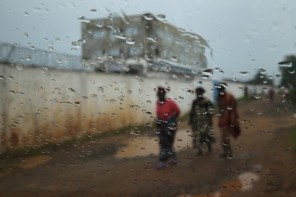I found a lot of food for thought in Nathan Schneider’s interview of philospher Judith Butler, in this week’s issue of Guernica. Schneider talks to Butler about her book, “Frames of War: When is life grievable?” which seems from the interview like it’s about, to put it very bluntly, who we are okay killing, or letting die, and why. I find something analogous, though not exactly synonymous, in Butler’s ideas to Helen Fein’s locution “the universe of moral obligation,” and the theory she builds around it.
Most of the interview — and maybe the book, I don’t know because I can’t get a copy — is about politicians, or power, or statecraft, or all three, and how human beings end up on the deadly side of decisions that get made. But I find myself mulling this section over and over, thinking about its relevance for journalists in my part of the world:
A life that is in some sense socially dead or already “lost” cannot be grieved when it is actually destroyed. And I think we can see that entire populations are regarded as negligible life by warring powers, and so when they are destroyed, there is no great sense that a heinous act and egregious loss have taken place. My question is: how do we understand this nefarious distinction that gets set up between grievable and ungrievable lives?
Okay, I’m thinking out loud here, but what the hell. Come along:
If you take out “warring powers,” at least, and maybe “egregious loss” — but maybe not, if you don’t straight off substitute ‘journalism’ as the agent of the sentence — these are fair questions to put to me and my colleagues.
The conflict journalism written from Africa in the 1990s, you could say, immediately sets up its subjects as “socially dead or already ‘lost'” — not just to the inevitability of the violence at play, but to their own history (think the profession’s favorite explanation of Rwanda, “ancient tribal hatreds”).
And how could a journalist who doesn’t know the country have any sense of what egregious loss has taken place? It’s impossible, and thereby impossible for us to impart that sense. And even if we could, it would be hard to professionalize that.
Heinous act, though, we all should know — and do, and it’s no surprise than that the journalists who covered, say, Rwanda’s genocide revisited it later reflectively, either in overt memoirs or in the kind of work that lets one exercise regret (thinking here of the return, by the video journalist who took the only known footage of a killing during the genocide, to try and find out what happened to the people in his frames). But the moral stance that allows us to recognize a heinous act is not allowed into our copy.
So how do we as journalists, with all of our obligations to subject and reader and record, be sure we’re not part of setting up that nefarious distinction?
Just musing. Meanwhile, if anyone is coming out this way and wants to sherpa me a copy of Judith Butler’s book, I’d be super grateful.

